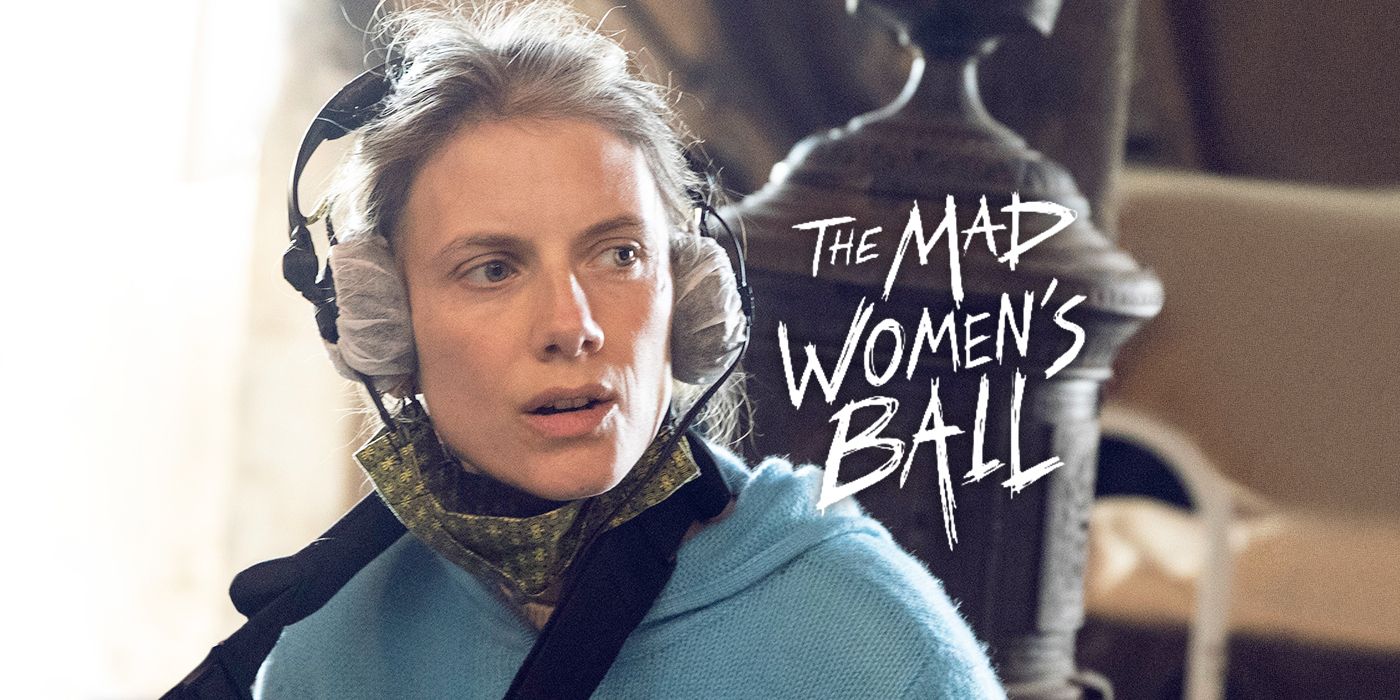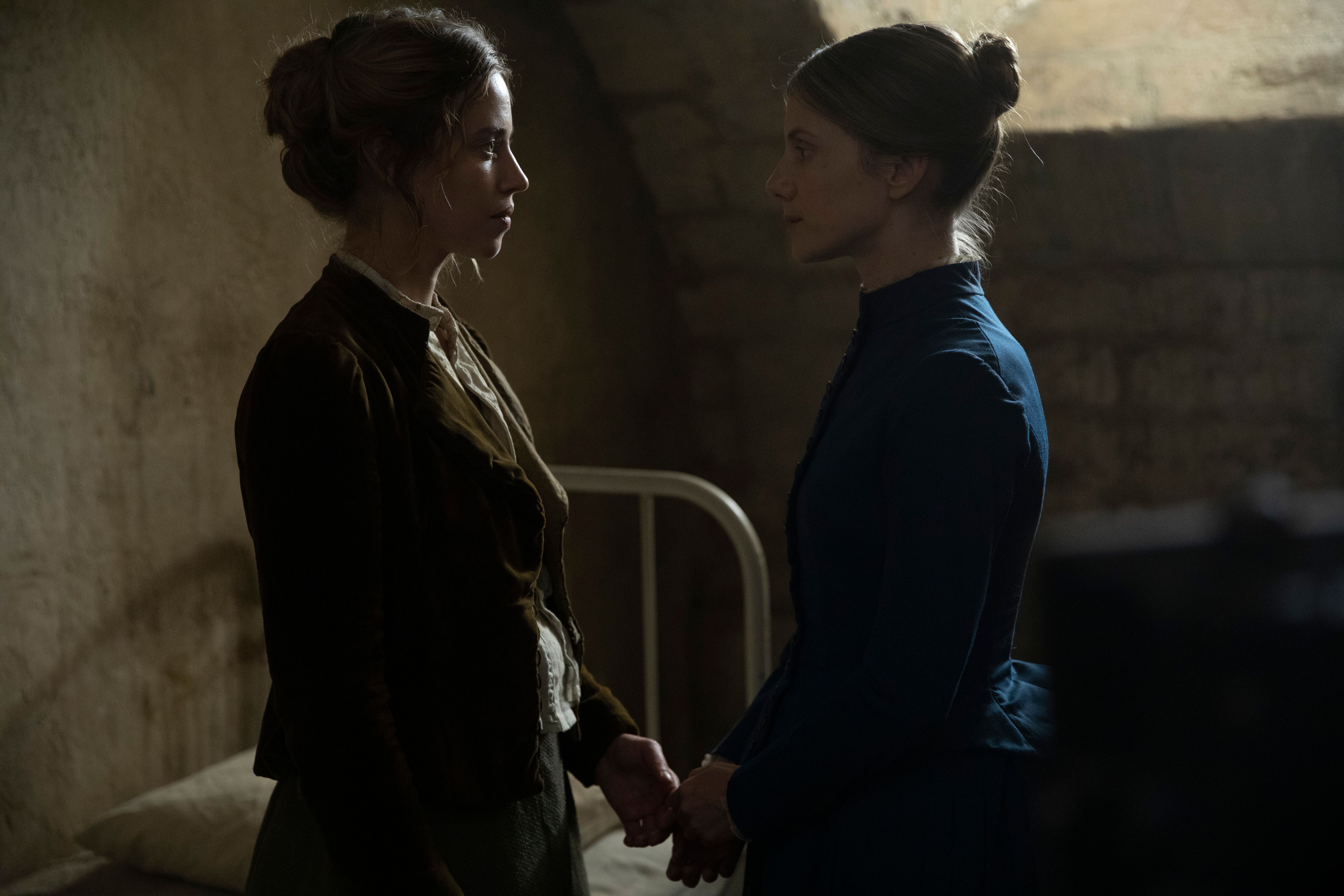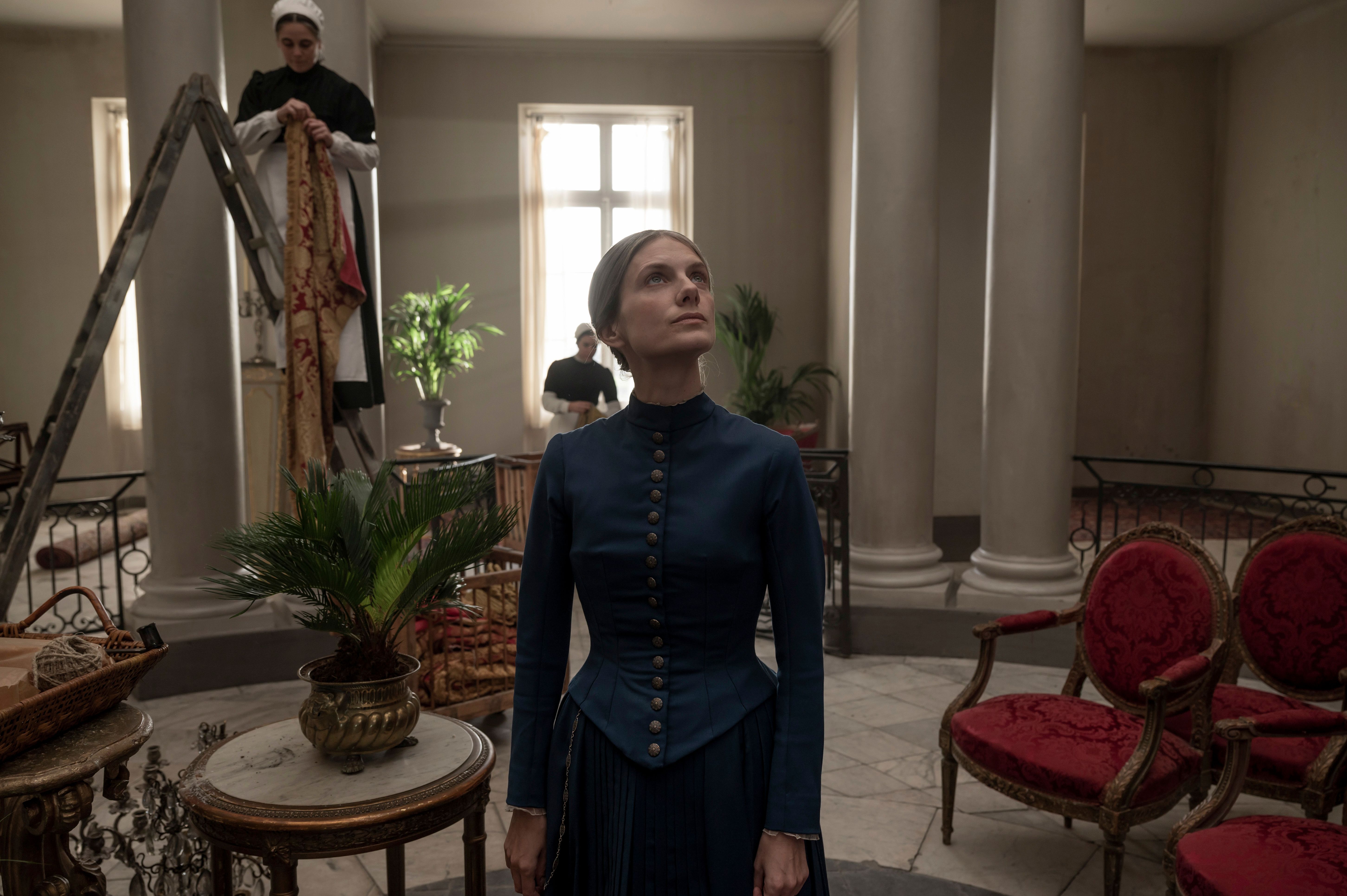One of my favorite films at this year’s Toronto International Film Festival was The Mad Women’s Ball. Written, directed by, and starring Mélanie Laurent, the film is based on the novel Le bal des folles by Victoria Mas and it’s about a woman (Lou de Laâge) unfairly institutionalized in a Paris asylum during the late 19th century and what happens while there. Laurent plays the head nurse and forms a strong bond with de Laâge’s character. While I don’t want to reveal more of the story, I’ll say Laurent does an excellent job adapting the material for the screen and bringing out great performances from the entire cast. In addition, the film shines a light on the mistreatment of women and how little control they had over their lives during that time period. The film also stars Emmanuelle Bercot, Benjamin Voisin, Cédric Khan, Christophe Montenez, Lomane De Dietrich and Grégoire Bonnet.
Shortly after seeing the film, I spoke with Mélanie Laurent. During the wide-ranging interview, she talked about why she wanted to tell this story, what she was shocked to learn when researching the material, what it means to be Amazon’s first original French movie, how streaming and theaters can co-exist, what she has stolen from directors like Quentin Tarantino and started using on her set, and more. Towards the end of the interview, she revealed what happened to The Nightingale, the WWII movie starring Dakota Fanning and Elle Fanning that she was previously attached to direct, and how she is preparing to make a limited series about Suzanne Noel, the pioneer of plastic surgery.
Finally, if you have Amazon Prime Video, you can watch The Mad Women’s Ball on Prime Video right now.
Check out what Mélanie Laurent had to say below.
COLLIDER: What do you think would have happened in your life if you had not visited the set of Asterix and Obelix vs. Caesar when you were growing up?
MELANIE LAURENT: I would probably make cheese.
(laughing) Sometimes it's those moments in life that you don't expect that completely can change the direction-
LAURENT: Totally.
For people that don't realize, that literally changed your life.
LAURENT: Yeah, totally. He really opened a new path, so I would have probably tried to become a director, but as an actor, I don't know where I would be.
If I'm not mistaken, your dad is the voice of Ned Flanders in France. Could you watch The Simpsons as a child, or was it too weird for you?
LAURENT: I loved it. You know what, with my brother, that was the best excuse. We were watching TV all the time, and we were pressing one channel that was him as the voice of a documentary. So, first channel would be like, "The shark is under the water," and I was like, "Dad!" The second channel was him like, Melrose Place, and then his third one… He was a really big star, so every time we were turning on the TV, he was in it, so no, I loved it.
That's actually really cool. I really enjoyed your work in Oxygen, and I just have to ask real quick, were you very happy when that shoot ended? Because I cannot imagine it was fun to be in that box for the shoot.
LAURENT: The whole shoot was totally insane, so I don't remember what I loved the most and what I was fearing the most. I just know that I survived at the end.
If you get the financing to direct anything that you want, what would you make, and why?
LAURENT: I would pick the most amazing screenwriters, and I would ask them to come up with an amazing, beautiful story about eco-feminism, when you just consult nature and women, and maybe in a big science fiction movie, when you explain how we destroyed the nature as we destroyed the women, and how we just lost it.
How have you been describing the film to friends and family?
LAURENT: I would say, "This is a movie who talks about women rights a hundred years ago. Watch it and tell me what you think."
Well, one of the things that the film does such a great job of is reminding the audience how little control women had back then. It was borderline criminal. Was that one of the aspects of this story that said, "I want to make this movie"?
LAURENT: Yeah, I was looking for a powerful story, and I also didn't want to just make a feminist movie. I was looking for other themes, and I thought the movie talked about spiritualism and death and love and friendship and freedom and belief, and I love the book for that. But obviously, it was terrifying to realize, especially when I get into those research about Charcot and about that period of time and about women's rights. I think it was a modern way to talk about what happened to us yesterday, instead of today, just as a reminder.
This is Amazon's first French original film. What did it mean to you to be the first film and to work with Amazon?
LAURENT: Yeah. That was insane, because I was supposed to go through theaters, so we worked the classic way, for months of prep, and then everything was too insane in France at that moment. We had the second wave, a traffic jam about release, and Amazon showed up and was like, "We want to make the movie, and the movie is going to happen." Also, we don't have big studios really in France, so that was my big first studio movie. And then, it just let me free.
I was really surprised and happy to see that they never showed up on my set, never showed up in my editing room, and they just helped me and pushed me to be more radical and to go into that author world. When I realized I was the first French movie to have been produced, I was feeling very honored.
I love seeing movies in a movie theater. I mean, that's like my church, you know, the movie theater, but streaming has allowed so many more people to be making movies. I view streaming as a benefit that helps the movie industry, what’s your take on streaming.
LAURENT: I think we shouldn't put theaters versus platforms. I think they both should co-exist, and I think at some point soon, I have a feeling that those big platforms going to find a way to make those two co-existing, and buying theaters and save them instead of close them, and pretty, I don't know, faithful about that.
Also, when you think about the pandemic, the whole industry fell apart. So many people didn't work, and those platforms injected money to make everybody work again. They kind of saved the industry at some point, so we cannot just be like, "They're bad and they just take advantage."
It's a very complex situation, but I feel like it's the new world. We also have to listen to what people want, and they want to watch many things and many TV shows and they want to be in their beds and sharing things with the intimacy they want. Also, we maybe should produce a little bit less movies in theaters, and having more quality, and also getting that audience back to something special.
There's a lot of content. I will definitely agree with you on that. Institutions nowadays are not well done. I can't imagine what they were like a hundred years ago, and what you're talking about in your film. What were some of the things that really shocked you or surprised you when you were researching to write the movie?
LAURENT: There is one thing that I was totally freaked out about, because I thought those women needed help, in a way. I thought they were mental at some point. When I did research, I realized any woman, melancholic, was crazy enough to be there.
A lot of cases of women being raped, had a moment of hysteria, obviously, after the rape, then went to the hospital. That unfair and crazy nightmare was very shocking for me, more than those men who were using those women and playing the doctors and making experiments, because I think we always knew that about doctors in general at that period of time. But when I realized they were not really sick, totally freaked me out.
That freaks me out as well. It's terrible. The performances that you crafted in this film are so good and you've obviously acted in a number of things. What have you learned as an actor that has helped you as a director, when you're crafting those performances on set? Are there certain things that you like being told that you have now used as a director to help craft performances?
LAURENT: Yeah. I'm stealing many things from other directors. Quentin Tarantino was putting music on set. I stole that from him. I loved working with my Mike Myers, who would just let us be totally free, and I stole a little bit of that spirit onset too.
I had so many amazing experiences with so many amazing directors and I'm so grateful for that. They always taught me things, to be the director I am today. As an actor, I just know that I love the director who knows what he wants or she wants, and I love when a director is specific; when he actually can translate what he has in mind to words to make it clear for you. Then it's so easy for an actor to just deliver something, and that's not always the case.
I've heard that from a number of people. I am fascinated by the editing process, because that's ultimately where it comes together. How did your film possibly change in the editing room, that you weren't expecting?
LAURENT: First of all, I changed my editor for the first time, and I took a woman. She was so amazing. She took my baby and she made that baby walk. When an editor gets you and gets what you want and gets what you wanted to show, it's pretty magical. We worked, obviously, but she took the lead many times, and I just followed.
I've spoken to a lot of directors, and sometimes they'll have a much longer cut of the movie and they have to pull it down to get it to a sensible running time, if you will. Did you have a much longer cut at some point?
LAURENT: Oh, yeah. I had two hours and a half.
Was that a cut, though, that you were very happy with?
LAURENT: It was my first cut, my first draft, and I loved it, which is absolutely impossible to love, because usually you're so depressed. I loved it, and then I had a hard time to love the movie for months. I just feel like when I saw that first cut, I was like, "Oh, this is the movie I wanted to make, so I knew something was there. I knew that what I dreamed of sometimes was somewhere in that first draft.
Completely. One of the things with the streaming services that I always wonder is how they don't release sometimes deleted scenes, or if a director has a longer cut they want to share. It's just very weird that it's just that version of the movie, and nothing else. Have you had any conversations with Amazon about showing a longer version, or not at all?
LAURENT: No, because I don't have another longer version that I would love to show. Yeah, we should ask them, because that could be very interesting.
Before I run out of time with you, because I'm just about out of time, whatever happened with The Nightingale? Is that going to happen? I don't even know if you shot it, or if you didn't shoot it.
LAURENT: I prepped for nine weeks, and then COVID arrived and stopped everything. It's super hard for us to find another date and to make everybody on board at the same time, so it's a mess.
Would you think about recasting to get it so you can make it or is it one of these things without Elle and Dakota, forget it. I'm not doing it?
LAURENT: Yeah. For me, there was them, for sure. I didn't want to recast them at all.
Do you know what you're going to do next, what's coming up for you?
LAURENT: Yeah. I would love to make the biopic of a woman called Suzanne Noel. She was the pioneer of plastic surgery, and she did amazing things. She fixed the broken faces in the First War, and she changed Jews' faces, searching by the Gestapo during the Second War. She was brilliant and strong and the pioneer also of feminism, so I hope I'm going to do a limited series about her.
I think these limited series can give you so much more, because you can have these quiet moments with people that you really can't have in a movie. You can have a five-minute scene of just two people talking, and in a movie, that's five minutes. You can't do that.
LAURENT: I have four hours.
Ah, there you go. Is it for a streamer? Do you already have it set up?
LAURENT: Yes. I mean, let's wait, because, if they change their minds... You never know.



.JPG)
.JPG)

.jpg)
.JPG)